- Home
- Conn Iggulden
The Gods of War Page 28
The Gods of War Read online
Page 28
“Seven days, though!” Julius snapped. “Shall I turn tail and meekly follow the orders of the gold-faced boy? That’s if they were his orders at all and not just the whim of one of his controlling clique. Alexander would be appalled if he could see this city treat me in such a fashion. Did I say they revere him as a god?”
“You mentioned it,” Octavian replied, though Julius did not seem to hear him. He stared in wonder as he considered the idea.
“His statue adorns the temples of their gods here, with incense and offerings. It is astonishing. Porphiris said that Ptolemy himself was divine. These are a strange people, Octavian. And why would you cut the testicles from a man? Does it make him stronger, or better able to concentrate? What benefit is there in such a practice? There were some with the king who could have been men or women, I couldn’t tell. Perhaps they had been gelded. I have seen some strange things over the years—do you remember the skulls of the Suebi? Incredible.”
Octavian watched Julius closely, suspecting that the tirade was finally coming to an end. He had not dared leave Julius alone in the grip of such a temper, but he could not help yawning as the night slipped by. Surely dawn could not be far off.
Domitius entered through tall bronze doors. Octavian rose as soon as he saw his friend’s expression.
“Julius,” Domitius said, “you should see this.”
“What is it?” Julius replied.
“I’m not sure if I know,” Domitius said with a grin. “There’s a man the size of Ciro at the gate. He’s carrying a carpet.”
Julius looked blankly at him. “Is he selling it?”
“No, sir, he says it’s a gift from the queen of Egypt.”
Julius exchanged a glance with Octavian.
“Perhaps they want to make amends,” Octavian said, shrugging.
“Send him up,” Julius said.
Domitius vanished, returning with a man who loomed over the three Romans. Julius and Octavian heard his heavy step before he came through the doors, and they saw Domitius had not exaggerated. The man was tall and bearded, with powerful arms wrapped around a tube of gold cloth.
“Greetings and honor to you, Consul,” the man said in flawless Latin. “I bear the gift of Cleopatra, daughter of Isis, queen of Egypt, honored wife to Ptolemy.”
As he spoke the man lowered his burden to the floor with immense care. Something moved within it and Octavian whipped his sword from its sheath.
The stranger spun at the sound, his palms held up. “Please, there is no danger to you,” he said.
Octavian stepped forward with his blade and the man knelt quickly, unrolling the carpet with a jerk.
A young woman tumbled out, landing catlike on her hands and knees. Julius’s jaw dropped as she came to rest. A scanty patch of yellow silk covered her breasts and another wound around her waist, revealing long legs down to bare feet. Her skin was dark gold and her hair wild from her time in the carpet. Tendrils of it fell forward to cover a face flushed with heat and embarrassment. It may have been Julius’s imagination, but he thought he could hear her swearing softly under her breath.
As the Romans watched in astonishment, she put her lower lip half over the other and blew a tendril of hair out of her vision. Her gaze fixed on Julius as she arranged herself in a more dignified position and rose slowly.
“I am Cleopatra,” she said. “I would speak with you alone, Caesar.”
Julius was entranced. She had the body of a dancer, with heavy-lidded eyes and a full mouth that suggested a rare sensuality. Gold earrings gleamed and a red garnet like a drop of blood hung around her throat. She was as beautiful as he had heard.
“Leave us,” Julius said, without looking at the others.
Octavian hesitated for a moment until Julius met his eyes, then he left with Domitius and the bearded servant.
Julius crossed to a table and filled a silver cup with red wine, using the action to give him time to think. She came with him and accepted the cup in both hands.
“Why did you have yourself delivered in such a fashion?” Julius asked.
She drank deeply before replying and he wondered what it had been like to be trapped in the stifling cloth of the carpet for so long.
“If I had come openly, the courtiers would have imprisoned me. I am not welcome in Alexandria, not anymore.”
Her eyes never left his as she spoke, and Julius found her directness uncomfortable. He gestured to a bench and she followed him to it, drawing her legs up slowly under her.
“How can the queen be unwelcome?” Julius asked.
“Because I am at war, Caesar. My loyal warriors are at the borders of Syria, unable to enter Egypt. My life would have been worth nothing if I had come by day.”
“I don’t understand,” Julius said.
She leaned closer to him and he could smell a rich perfume coming from her bare skin like smoke. He found himself becoming aroused by the near-naked girl and struggled not to show it.
“My brother Ptolemy is thirteen years old,” she said. “Under Panek he has no say in the rule of my lands.”
“Your brother?” Julius said.
She nodded. “My brother and my husband, in one.” She saw his expression and laughed, a low chuckle that he enjoyed.
“It is a formal thing, Roman, to keep the bloodline pure. We were king and queen together, as my father married his own sister. When Ptolemy was of an age, I would have borne his children to rule after us.”
Julius felt lost amidst these revelations. He struggled to find something to break the silence that had sprung up between them.
“You speak my language beautifully,” he ventured.
She laughed again, delighting him. “My father taught it, though I am the first of his line to speak Egyptian. Would you prefer to converse in Greek? It was the language of my childhood.”
“It makes me glad to hear you say it,” he said earnestly. “I have admired Alexander all my life. To be here with the descendant of his general is intoxicating.”
“Egypt claims me now, Caesar; runs like fire in me,” she said.
Her skin was smooth copper-gold, oiled every day of her life. He knew she would be extraordinary to touch.
“But you cannot take your throne, for fear,” he said softly.
Cleopatra snorted. “Not of my people. They are loyal to the goddess in me.”
Julius frowned at the statement from such a youthful girl. “I do not believe such things.”
She looked at him with interest and he felt his pulses throb. “The flesh you see is nothing, Caesar. My Ka is divine within me, held until my death. You could not see it.”
“Your Ka?”
“My . . . spirit. My soul. Like a flame in a shuttered lamp, if you wish.”
Julius shook his head. Her perfume seemed to fill every breath he took, so close was he sitting to her. He had not seen her move, but the distance between them seemed to have shrunk and the room felt hot.
“You have not said why you came to me,” he said.
“Is it not obvious? I have heard of you, Caesar. I have prayed to Isis to be delivered from my exile and you were sent to me. You have an army to tip the balance in the very heart of Alexandria.” Her eyes pleaded.
“What of your own soldiers?” he asked.
“They are too few and spies crawl like flies around their camp. I risked death to reach you, Caesar, and I am only one.” She reached out to him and touched his face with a cool hand. “I need a man of honor, Caesar. I need him desperately. You may claim not to believe, but the gods led you here for this.”
Julius shook his head. “I followed Gnaeus Pompey, murdered on your own docks.”
She did not look away. “And what made him come to Alexander’s city? There are many ports. If you cannot believe, then give me my revenge as you take yours! The order for Pompey’s death bore the name of my family, in dishonor. Panek uses the royal seal as if it were his own. Will you help me, Roman?”
Julius rose clumsily from the couch,
overwhelmed by her. The idea of bringing the arrogant courtiers to their knees appealed to him. He thought of the extraordinarii and soldiers coming over from Asia Minor and wondered if they would arrive before his seven days were up.
“How many men do they have?” he said.
She smiled, unfolding her legs until her toes touched the bare marble floor.
Domitius and Octavian watched as Julius paced with new energy. He had not slept or taken time to shave, though the sun had risen over the city and the noise of trade and life came in through the high windows.
“This is not our struggle, Julius,” Octavian said, worried and upset. He could see the prospect of returning to Rome dwindling before him and had conceived an instant dislike for the woman who had brought the change.
“It is if I make it so,” Julius replied. “My word alone is reason enough.” He paused, wanting the younger man to understand. “If we intervene here, then perhaps one day this city will be part of our empire—and all of Egypt beyond it. Imagine that! Cities older than Greece and a pathway to the East.” His eyes were shining with the vision and Octavian knew there would be no turning him home.
“I assume her beauty has not affected your judgment,” Octavian said.
Julius set his jaw in anger, then shrugged. “I am not immune, but this is a chance to set the precedent of Roman interest. I could not have asked for a better chance than to cut the knots of their tangled politics. If the gods are on our side, they are Roman gods! It cries out to me, Octavian.”
“And Rome cries out for your return!” Octavian snapped, surprising them both. “You have won all your battles. It is time to return to the rewards, surely? The men are expecting your word on it.”
Julius rubbed his chin with his hand, looking suddenly weary.
“If I go back, I may never leave Rome again. I’ve grown too old to be planning new campaigns. But not old enough to fear one more for the right cause. How can I claim to bring the light of our civilization and then turn away from this? If we only look inward to our own affairs, the influence we have gained will be wasted.” He paused in front of Octavian, gripping him by the shoulder. “I intend to use the influence those years of battle have won for me. I would have you join me willingly, but if you cannot, you may return.”
“Without you?” Octavian said, knowing the answer. Julius nodded and Octavian sighed. “My place is at your right hand. If you say we must go on, I will be there, as I always have been.”
“You are a good man, Octavian. If there are no sons to follow me, I would be proud to see you in my place.” He chuckled. “Where else would you find an education like this one! I can teach you more politics here than you would find in a decade of Senate meetings. Think of the future, Octavian. Think of what you will accomplish when I am gone. This is Alexander’s city and it could be a prize for Rome. Who better than we to take his mantle?”
Octavian nodded slowly, and Julius clapped him on the arm.
“How many are we facing, exactly?” Domitius said, interrupting. Both men seemed to break free of some private communication.
“Too many for the Tenth alone,” Julius said. “We must wait for the Fourth to arrive. Even then, we might need Cleopatra’s army before we are done. Though they are so ringed about with informers that the courtiers will know if they begin to move. We need to wrench an advantage from the first moment, while they still think we are going to leave in peace. We have surprise. With the Fourth here in strength, we’ll strike where they don’t expect it.”
He grinned and Octavian responded, feeling the excitement despite his misgivings.
“What do you have in mind?” Octavian asked.
“It is like a game of latrunculi,” Julius said. “We must capture the king.”
CHAPTER 25
In gloom, the legions waited, crammed into every corner of the Roman quarters. Julius himself had gone down to the docks to greet the soldiers of the Fourth as they sailed in. They had come expecting to pursue Pompey across a new continent, but instead found themselves part of a plot to kidnap a boy king. It may have been the return of warm nights, or simply the fact that Pompey was dead and they were free at last, but a rare mood of juvenile excitement had stolen amongst them. They nudged each other and smiled in the darkness. Caesar had triumphed over his enemies, and they had been there to see it happen.
Julius waited by the heavy doors, peering out at the moon. He heard a snort from a Roman mount and glanced at the source, watching shadows move. The horses had been well fed on grain, better than they had seen in weeks. The palace too was filled with stores, the first choice of cargoes from Cyprus, Greece, even Sicily. Roman gold had weight on the docks of Alexandria.
Despite the tension, Julius could not hide the fact that he was enjoying himself. Ciro, Brutus, and Regulus had come across to Egypt. He had his generals around him once more and he felt gloriously alive.
At Julius’s side, Brutus could not share the lightness of the others. His broken arm had healed in the weeks of pursuit, but the muscles were still too weak to risk on such a venture. He yearned to go with them, for things to be as they had once been. There were times when he could forget everything that had happened and imagine they were back in Gaul or Spain, with trust and friendship binding them together. However, he could not miss the glances of dislike from the men to remind him of his new status. They did not allow him the luxury of any doubt on the subject. He sensed Octavian was watching him, and stared at nothing until the feeling faded. It would change when his strength returned. He would make it change. Until then, he accepted that he would stay and barricade the palace ready for their return.
Facing the night, Julius did not see Cleopatra at first. She came silently into the packed entrance hall without announcement, weaving her way in and out of startled soldiers. Julius turned in time to see her smile as one of the men let out a low whistle and a ripple of laughter went through them. He was at a loss to say how she had done it, but she had found a new costume only slightly less revealing than the one she had worn on their first meeting. Her lithe movement was girlish, though her eyes were older. Her hair was held back by a bar of gold and her legs and bare stomach drew sidelong glances as she walked amongst them.
Julius found himself blushing as she approached him, knowing his soldiers were happily drawing their own conclusions about his sudden interest in Egypt. His generals had met her before, but they still stood rooted as she spun in place to face the men.
“I have heard of Roman courage,” she said, her voice soft. “And I have seen your honor in coming to my aid in this. You will learn the gratitude of a queen when I have my throne again.”
She bowed to the rough killers of Rome and in that moment they would have gone anywhere for her. They knew better than to cheer the beauty who came so humbly amongst them, but a low murmur of approval went through the palace, almost a growl.
“It’s time,” Julius said, looking strangely at the queen.
Her skin gleamed in the shadows and her eyes were bright with the moon as she turned to him. Before he could react, she took a step and kissed him lightly on the lips. He knew he was blushing again with embarrassment. She was less than half his age and he could practically feel the grins of the men as they exchanged glances.
He cleared his throat, trying to summon his dignity. “You have your orders, gentlemen. Remember that you must not engage the enemy unless you have to. We find the king and get straight back here before they can muster enough of a force to slow us. You’ll hear the retreat horn blown when Ptolemy is captured, and when you do, get out as fast as you can. If you are separated, come here. Understood?”
A chorus of assenting murmurs answered him and he nodded, heaving open the door to the moonlit garden.
“Then follow me, gentlemen,” he said, responding at last to their bright eyes and smothered laughter with a grin. “Follow me.”
They drew their swords and rose to their feet, moving out into the darkness. It took a long time for the last of t
hem to pass through from the furthest reaches of the palace. Only one cohort remained behind as Brutus closed the doors, plunging them all into a deeper dark. He turned to them and hesitated in the presence of the queen who stood like a scented statue, watching him.
“Block the windows and entrances,” he ordered, his voice sounding harsh after the echoing silence. “Use grain sacks and anything else you can lift—the heavier the better.”
The single cohort moved quickly into action, its six centurions snapping out orders until the least of them had work. The entrance hall emptied, leaving Brutus standing uncomfortably with the Egyptian queen.
Her voice came from the shadows. “The general in silver armor . . .”
His eyes adjusted to see the moon outline her bare shoulders in a faint glimmer. He shivered. “I am, mistress. Or should I call you Goddess?” He could feel her gaze like a weight.
“August Majesty is one title, though I carry the goddess in me. Does the idea offend you, Roman?”
Brutus shrugged. “I have seen a lot of foreign lands. I’ve seen people who paint their skins blue. There isn’t much that can surprise me now.”
“You must have been with Caesar for many years,” she said.
He looked away, suddenly unnerved. Would Julius have spoken of him? “More than I care to tell you,” he said.
“How were you injured? In his service?”
He snorted to himself then, growing irritated with the stream of questions. “I was injured in battle, Majesty. I think you may have already heard the details.”
He raised his splinted arm, as if to have it inspected. In response, she came closer. She reached out and, despite himself, he shivered again at her cool touch. She wore a heavy ring of gold with a carved ruby. In the gloom it was as black as the night sky.
“You are the one who betrayed him,” she said in fascination. “Tell me, why did he let you live?”
He blinked at her bluntness. Here was a woman used to every question being answered, every whim met. She seemed unaware of the pain she was causing him. “He could not find a better general. I am a perfect scourge in the field, though not as you see me now.”

 The Khan Series 5-Book Bundle
The Khan Series 5-Book Bundle Tollins 2: Dynamite Tales
Tollins 2: Dynamite Tales Tollins: Explosive Tales for Children
Tollins: Explosive Tales for Children The Field of Swords
The Field of Swords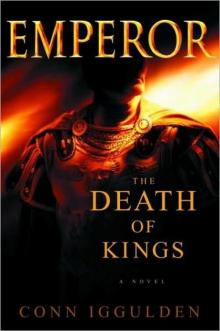 The Death of Kings
The Death of Kings Quantum of Tweed: The Man With the Nissan Micra
Quantum of Tweed: The Man With the Nissan Micra Bones of the Hills
Bones of the Hills Genghis: Birth of an Empire
Genghis: Birth of an Empire The Gates of Rome
The Gates of Rome Dunstan
Dunstan Fig Tree
Fig Tree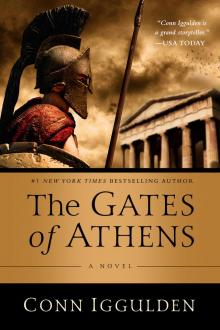 The Gates of Athens
The Gates of Athens Stormbird
Stormbird Khan: Empire of Silver
Khan: Empire of Silver The Abbot's Tale
The Abbot's Tale Gengis: Lords of the Bow
Gengis: Lords of the Bow The Gods of War
The Gods of War Blackwater
Blackwater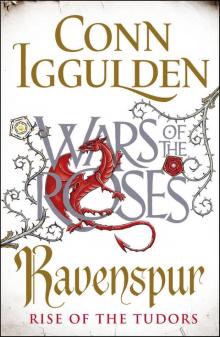 Ravenspur: Rise of the Tudors
Ravenspur: Rise of the Tudors Wars of the Roses: Trinity (War of the Roses Book 2)
Wars of the Roses: Trinity (War of the Roses Book 2) The Gods of war e-4
The Gods of war e-4 The Dangerous Book of Heroes
The Dangerous Book of Heroes Stormbird wotr-1
Stormbird wotr-1 Emperor: The Death of Kings
Emperor: The Death of Kings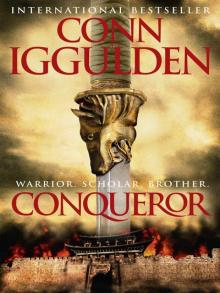 Conqueror (2011) c-5
Conqueror (2011) c-5 The Dangerous Book for Boys
The Dangerous Book for Boys Genghis Lords of the Bow
Genghis Lords of the Bow Emperor: The Blood of Gods (Special Edition) (Emperor Series, Book 5)
Emperor: The Blood of Gods (Special Edition) (Emperor Series, Book 5) The Emperor Series: Books 1-5
The Emperor Series: Books 1-5 Lords of the Bow c-2
Lords of the Bow c-2 Lords of the Bow
Lords of the Bow Quantum of Tweed
Quantum of Tweed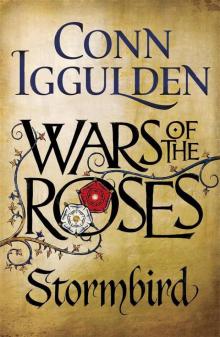 Wars of the Roses 01 - Stormbird
Wars of the Roses 01 - Stormbird Empire of Silver c-4
Empire of Silver c-4 Birth of an Empire
Birth of an Empire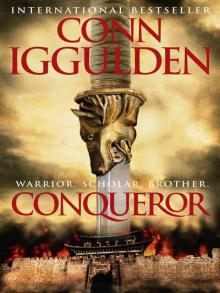 Conqueror (2011)
Conqueror (2011) Wars of the Roses: Bloodline: Book 3 (The Wars of the Roses)
Wars of the Roses: Bloodline: Book 3 (The Wars of the Roses) Bones Of the Hills c-3
Bones Of the Hills c-3 Empire of Silver
Empire of Silver The Khan Series 5-Book Bundle: Genghis: Birth of an Empire, Genghis: Bones of the Hills, Genghis: Lords of the Bow, Khan: Empire of Silver, Conqueror
The Khan Series 5-Book Bundle: Genghis: Birth of an Empire, Genghis: Bones of the Hills, Genghis: Lords of the Bow, Khan: Empire of Silver, Conqueror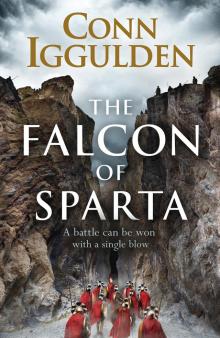 The Falcon of Sparta
The Falcon of Sparta Explosive Tales for Children
Explosive Tales for Children